The Ultimate Guide To Enterprise SaaS SEO
Did you know that 93% of web experiences start with a simple search on engines like Google? That’s right; this fact holds even greater significance for enterprise businesses.
Without a robust SEO strategy, businesses risk losing valuable online visibility and potential customers. But don’t worry! We’re here to help you.
This guide will discuss why enterprise SaaS SEO is important and what differentiates it from regular SEO. We’ll also explore the advantages it brings and the difficulties it might pose. Plus, we’ll share some ideas and tools to help SaaS companies with their enterprise SEO.
We’ll also show you examples of companies that have done it right.
So, learn how to make your SaaS business shine online!
Table of Contents
- What is Enterprise SaaS SEO?
- Benefits of Enterprise SaaS SEO
- Why Does SEO Matter For Enterprise SaaS Companies?
- What Sets Enterprise SaaS SEO Apart From Normal SEO?
- What Are The Primary Difficulties Faced In Enterprise SaaS SEO?
- How To Do Enterprise SaaS SEO?
- Step 1: Research Your Enterprise Audience
- Step 2: Enterprise SEO Keyword Research
- Step 3: Create Your Content Strategy
- Step 4: Build a Strong Link Profile
- Step 5: Optimize Website Structure and Navigation
- Step 6: Master Technical SEO
- Step 7: Focus on Mobile Optimization
- Step 8: Measure and Analyze Performance
- Best Tips for SaaS SEO
- 1. Conduct an In-Depth Competitor Analysis
- 2. Build Customer Personas
- 3. Perform Keyword Research and Build a Strategy
- 4. Optimize Your Site Speed
- 5. Produce High-Quality Content
- 6. Utilize Internal Linking
- 7. Focus on On-Page SEO
- 8. Optimize for Local Search
- 9. Identify Your Competitors’ SEO Backlinks and Replicate
- 10. Monitor Your Keyword Rankings
- Best Tools for Enterprise SaaS SEO
- Successful Enterprise SaaS SEO Examples
- Elevate Your Enterprise SaaS SEO Today
- FAQs
What is Enterprise SaaS SEO?
Enterprise SaaS SEO means applying strong SEO strategies to the websites of SaaS companies with extensive offerings and a wide array of products and services.
More than half of all web traffic, about 53.3%, comes from organic search, which generates double the revenue for B2B companies compared to other marketing channels. Consequently, enterprise SEO concentrates on enhancing the online visibility of large corporations.
Dedicated teams of experts in enterprise SEO handle the various pages for each product. In contrast to SEO for small businesses, enterprise SaaS SEO emphasizes popular and fiercely competitive keywords.
Every enterprise SaaS website has common traits:
- The impact of the website on brand image and revenue.
- The teamwork and project management required to maintain the website.
- The amount of automation needed to handle tasks for thousands of web pages.
Benefits of Enterprise SaaS SEO

Enterprise SaaS SEO, or search engine optimization, benefits big companies offering software services. Here’s the lowdown on why it’s so important:
1. Boosts Online Visibility
Enterprise SaaS SEO helps large businesses appear prominently when people search online. It means more folks find their services, leading to increased website traffic.
2. Revenue Growth
Better visibility often translates to more customers, which, in turn, means more revenue. Enterprise SaaS companies can make a lot more money through effective SEO strategies.
3. Strategic Marketing
Enterprise SEO software and strategies focus on highly effective marketing techniques tailored to the big league. It’s like having a powerful marketing weapon with you.
4. Enhances Brand Reputation
Ranking high on search engines portrays a trustworthy image. Customers tend to trust businesses that appear at the top, boosting brand reputation.
5. Efficiency and Automation
SEO strategies often include automating tasks for thousands of web pages. It means less manual work and more efficiency in managing the website.
Therefore, Enterprise SaaS SEO is the golden ticket to improving brand reputation, increasing revenue, and making the most of the vast online market. It’s like having a secret sauce for success in the digital world of enterprise SaaS.
Why Does SEO Matter For Enterprise SaaS Companies?

SEO is a game-changer for Enterprise SaaS companies, and here’s why:
1. Stiff Competition
Everyone wants to be the top choice in the bustling world of Enterprise SaaS. With the right enterprise SaaS marketing strategy and search engine optimization, you can ensure your offerings are seen by the right people at the right time, giving you a competitive edge.
2. Conventional Fixes Don’t Work
Traditional marketing methods often fall short in the digital age. Enterprise search engine optimization and SaaS SEO strategies are the modern tools to get ahead. They connect you with your target audience, bringing organic traffic genuinely interested in your offer.
3. Internal Collaboration is Critical
Enterprise SaaS SEO isn’t a one-person job. It requires teamwork and collaboration across your organization. Technical SEO experts, content marketing specialists, and your marketing strategy must align to make your SEO campaign effective.
SEO for Enterprise SaaS isn’t just a choice; it’s a necessity. It’s the key to outshining competitors, reaching your target audience, and ensuring your marketing efforts pay off. So, if you want your enterprise SaaS company to thrive in the digital landscape, SEO should be at the core of your marketing strategy.
What Sets Enterprise SaaS SEO Apart From Normal SEO?

Enterprise SaaS SEO is a bit like “normal” SEO but has supercharged features that make it stand out. Let’s break down the key differences in simple terms:
1. Scalability and Automation
In Enterprise SaaS SEO, you’re dealing with a large-scale operation. You have tons of web pages and content to manage. That’s where automation becomes crucial. Special SEO tools and strategies help handle tasks efficiently across thousands of pages, something not as critical in “normal” SEO.
2. Multiple Locations and Teams
Big enterprises often have multiple locations and SEO teams working on their SEO efforts. Coordinating all of this is a unique challenge. Enterprise SEO strategies must ensure everyone’s on the same page and working towards the shared objective.
3. Multiple Sites and Subdomains
Enterprise SaaS companies often have multiple websites and subdomains. Each of these needs to be optimized effectively for search engines, which can be quite complex compared to handling just one site in “normal” SEO.
4. Reputation Management
Reputation management becomes a significant concern in Enterprise SaaS SEO. A key focus is ensuring your brand’s image remains positive across all locations and teams.
Enterprise SaaS SEO goes beyond what “normal” SEO covers. It’s about managing on a grand scale, coordinating diverse teams, optimizing numerous sites, and safeguarding your brand’s reputation. These factors make it a specialized field that requires unique strategies and tools.
What Are The Primary Difficulties Faced In Enterprise SaaS SEO?
Enterprise SaaS SEO has hurdles that can be quite challenging to overcome. Let’s dive into the top challenges and how they affect your SEO strategy:
1. Complex Technical Challenges

Managing a large website can be like trying to untangle a web of wires. You need SEO software and strategies that can handle minute technical issues, from optimizing for search intent to improving your search engine rankings. It’s a puzzle that requires careful planning.
2. Long Sales Cycles

Enterprise software sales often involve lengthy sales cycles. Your SEO strategy must align with this process. You need to create content that caters to each stage of the sales funnel, addressing the pain points of your potential customers while keeping your target keywords in mind.
3. Pitching Leadership & Securing Buy-in

Convincing your company’s leadership to invest in SaaS SEO can be tough. You need a solid pitch that demonstrates the value of your SEO efforts, including how it can boost keyword rankings, improve search engine rankings, and contribute to overall growth.
4. Specific and Limited Target Customers

Enterprise software usually caters to a niche audience. Your SEO strategy should be finely tuned to reach this specific group. It’s all about local SEO and tailoring your content to address your target customers’ unique needs and interests.
5. Multiple Teams

In a large enterprise, different teams may be responsible for various aspects of the website. Coordinating these teams and ensuring everyone is on the same page with your SaaS SEO strategy is a significant challenge.
6. Large and Complex Websites
Enterprise websites can be massive, with numerous pages and subdomains. Managing internal linking, optimizing each page for search intent, and keeping track of keyword rankings across this vast landscape is no small feat.
To overcome these challenges, you’ll need a comprehensive SaaS SEO strategy that integrates technical expertise, content marketing, local SEO tactics, and powerful SEO software tools. It’s a journey that requires patience, adaptability, and a deep understanding of your enterprise software’s unique selling and customer pain points. By addressing these challenges head-on, you can navigate the complex world of Enterprise SaaS SEO and unlock its full potential for your business.
How To Do Enterprise SaaS SEO?
Let’s break down the essential steps to master Enterprise SaaS SEO, ensuring your enterprise software reaches its full potential.
Step 1: Research Your Enterprise Audience

A better understanding of your target audience is the foundation of any successful enterprise SaaS SEO strategy. Your audience comprises decision-makers within businesses seeking enterprise software solutions. To start:
- Identify the specific pain points and challenges your target audience faces daily.
- Determine the various stages of the sales funnel your potential customers go through.
- Collect data on your audience’s demographics, industry, and preferences.
This research helps you tailor your content and SEO efforts to meet your audience’s needs and interests.
Step 2: Enterprise SEO Keyword Research

In the enterprise software realm, target keywords are often specific and industry-related. To perform effective keyword research:
- Identify relevant target keywords that align with your audience’s search intent.
- Use keyword research tools to discover long-tail keywords specific to enterprise software.
- Analyze competitor keywords and search engine rankings to find opportunities.
Your goal is to compile a list of target keywords that cater to your audience’s pain points and align with their search queries.
Step 3: Create Your Content Strategy

Once you have a list of target keywords, you can create a content strategy that addresses your audience’s needs at different stages of the sales funnel. This strategy should include:
- Blog posts, articles, and guides targeting informational keywords to educate and engage.
- Case studies and whitepapers showcasing the benefits of your enterprise software.
- Product pages and feature descriptions highlight what sets your software apart.
- Landing pages optimized for high-conversion keywords to capture leads.
Remember, your content should revolve around solving the pain points of your target audience while incorporating your chosen target keywords strategically.
Step 4: Build a Strong Link Profile

Link building is vital for improving search engine rankings. For enterprise SaaS SEO, focus on building high-quality backlinks from reputable sources within your industry. Some effective link-building strategies include:
- Guest posting on industry-related blogs and publications.
- Collaborating with influencers to promote your content.
- Creating shareable, link-worthy content that naturally attracts backlinks.
Building a strong link profile boosts your SEO and establishes your authority within the enterprise software sector.
Step 5: Optimize Website Structure and Navigation

Your website’s structure and navigation play an essential role in SEO. Ensure your website is user-friendly and search engine-friendly by:
- Implementing a clear and intuitive menu structure for easy navigation.
- Making a sitemap is like creating a map for search engines so they can find and understand your website’s pages easily.
- Using internal linking to guide users to relevant content and improve SEO.
An organized website makes it easier for people to use and improves the possibility of getting a better position in search engine results.
Step 6: Master Technical SEO

Technical SEO consists of optimizing the technical aspects of your website to enhance its performance. To master technical SEO for Enterprise SaaS:
- Optimize page load times to improve user experience and SEO.
- Ensure your website is mobile-friendly for users on smartphones and tablets.
Technical SEO ensures your website works well and can be found by search engines.
Step 7: Focus on Mobile Optimization

In today’s mobile-centric world, mobile optimization is a must. Many decision-makers within enterprises use mobile devices for research and decision-making.
- Your website responds and adapts to different screen sizes.
- Mobile page load times are optimized for a seamless user experience.
- Content is readable and navigable on mobile devices.
You can reach more people and make your website appear better on search engines by making it work well on mobile devices.
Step 8: Measure and Analyze Performance

No SEO strategy is complete without ongoing measurement and analysis. Use tools like Google Analytics and SEO software to:
- Track keyword rankings to see how your pages are performing in search results.
- Monitor organic traffic to evaluate the effectiveness of your SEO efforts.
- Analyze user behavior to make data-driven adjustments to your content and SEO strategy.
Regularly reviewing your SEO performance allows you to adapt to changing trends and refine your Enterprise SaaS marketing strategy for optimal results.
So, mastering Enterprise SaaS SEO is a continuous process that involves research, strategy, and ongoing optimization. By understanding your target audience’s pain points, conducting thorough keyword research, creating a content strategy, building a strong link profile, optimizing your website, and focusing on technical and mobile SEO, you can elevate your enterprise software’s search engine rankings and ultimately, your business’s success in the competitive world of enterprise SaaS. With the right Enterprise SEO services and strategies in place, your software will be poised for growth and recognition within the industry.
Best Tips for SaaS SEO
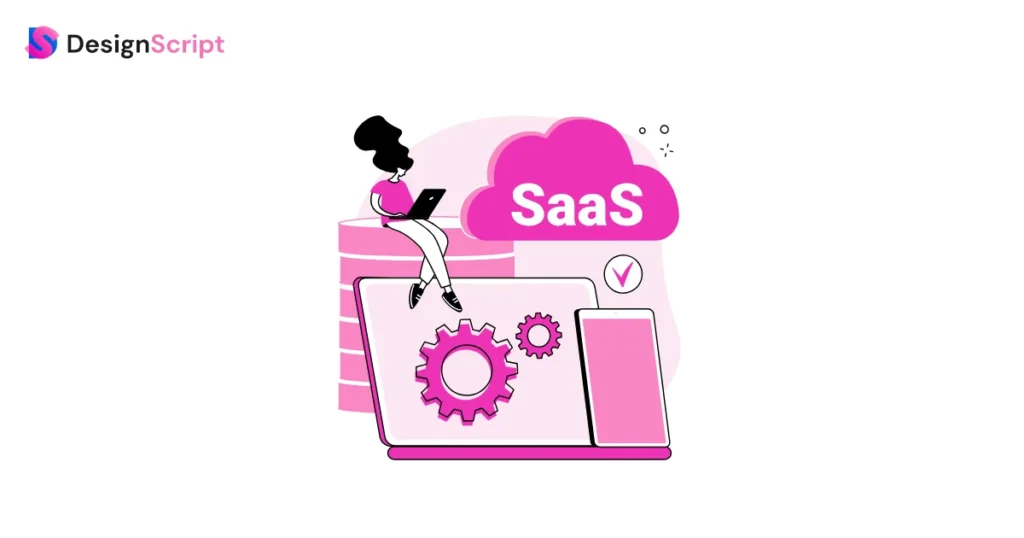
Let’s explore some of the best tips for SaaS SEO in simple and easy-to-understand language.
1. Conduct an In-Depth Competitor Analysis
Before diving into SEO, it’s crucial to understand what your competitors are doing. Analyze their websites, content, and keywords they’re targeting. This analysis can reveal gaps in the market that you can tap. Look for:
- The keywords they rank for.
- The quality of their content.
- Their backlink profile.
By understanding your competitors, you can fine-tune your SEO strategy to gain a competitive edge.
2. Build Customer Personas
Knowing your target audience is fundamental to SEO success. Creating customer personas involves:
- Identifying your ideal customer’s demographics.
- Understanding their pain points and needs.
- Recognizing where they spend their online time.
Customer personas help you tailor your content and SEO efforts to resonate with your audience.
3. Perform Keyword Research and Build a Strategy
Keyword research is the cornerstone of SEO. It involves finding the words and phrases people use when searching for SaaS solutions. Steps for effective keyword research include:
- Identifying relevant keywords related to your software.
- Assessing keyword search volume and competition.
- Prioritizing high-value keywords based on your goals.
Once you have a list of target keywords, build a strategy around them. Create high-quality content that addresses the intent behind these keywords.
4. Optimize Your Site Speed
Site speed matters for both user experience and SEO. Slow-loading websites can deter visitors and hurt your search engine rankings. To optimize site speed:
- Compress images to reduce file sizes.
- Minimize the use of large files and scripts.
- Use Content Delivery Networks (CDNs) to distribute content efficiently.
Faster websites are likely to rank well in search engine results and keep prospects engaged.
5. Produce High-Quality Content
High-quality content is king in the SEO world, and quality is key. High-quality content should be:
- Answer the questions and listen to the needs of the people.
- Be well-researched and informative.
- Use clear and concise language.
Making content that people find useful brings in visitors and makes other websites want to share your content. It helps make your SEO better.
6. Utilize Internal Linking
Imagine your website is like a big library; each page is a book. Internal linking is like creating paths that connect these books. When you link one page to another within your website, you help visitors navigate and discover more of your content. It’s like showing them around your library, ensuring they find all the interesting books.
Internal linking is essential for SEO because it:
- It helps search engines understand your website’s structure.
- Distributes “link juice” (a way of measuring a page’s authority) to other pages.
- Keeps visitors engaged by offering them related content.
To make the most of internal linking:
- Use descriptive anchor text (the clickable words)
- Create a logical hierarchy of links, with the most important pages receiving the most links.
- Make sure links are relevant and genuinely help users explore your site.
7. Focus on On-Page SEO
On-page SEO is all about making each web page as search-engine-friendly as possible. You want search engines to easily understand what each page is about and rank it well in search results. Here are some key on-page SEO tips:
- Keywords: Choose target keywords related to your SaaS product and use them naturally in your content. It helps search engines connect your page to relevant searches.
- Quality Content: Write high-quality, informative, engaging content that genuinely helps your audience. Content is king in the world of SEO.
- Meta Tags: Create interesting meta titles and descriptions for your pages. These appear in search results and can influence whether people click on your link.
- Image Optimization: Optimize images by using descriptive filenames and adding alt text. It makes sure search engines can figure out what’s in your pictures.
8. Optimize for Local Search
Local SEO is crucial if your SaaS business serves a specific location or region. It helps people in your area find your services. Here’s how to optimize for local search:
- Google My Business: Optimize your Google My Business listing. Provide accurate information, including your address, phone number, and business hours.
- Local Keywords: Use local keywords in your content. For example, if you offer SaaS services in New York City, include phrases like “SaaS solutions in NYC.”
- Online Reviews: Motivate customers to leave reviews on platforms like Google and Yelp. Positive reviews build trust and credibility.
- Local Directories: List your business on local directories and websites. It helps you appear in more local searches.
9. Identify Your Competitors’ SEO Backlinks and Replicate
Competitor analysis is a smart move in SEO. By studying what your competitors are doing, you can learn valuable lessons and discover opportunities. One area to focus on is backlinks.
Backlinks are similar to getting a thumbs-up or approval from other websites. Here’s how to identify and replicate your competitors’ backlinks:
- Use SEO tools to find the websites linking to your competitor’s content.
- Analyze these backlinks to see if they are from authoritative and relevant sources.
- Reach out to these sources and see if you can earn similar backlinks by providing valuable content or insights.
By replicating your competitors’ successful backlinks, you can boost your website’s visibility in search results.
10. Monitor Your Keyword Rankings
SEO is not a one-time work; it’s an ongoing effort. It would help if you kept an eye on how well your website performs in search results. It is where keyword ranking monitoring comes in.
Keyword rankings tell you where your web pages appear in search results for specific keywords. Here’s how to monitor them:
- Use SEO tools to keep track of your keyword rankings regularly.
- Pay attention to any changes. Are your rankings going up or down?
- Analyze the pages that are ranking well. Can you replicate their success on other pages?
Monitoring your keyword rankings allows you to adapt your SEO strategy. If certain keywords perform exceptionally well, you can develop more content around those topics to drive more organic traffic.
Best Tools for Enterprise SaaS SEO
Here’s a list of the top tools for enterprise SaaS SEO,
1. JetOctopus
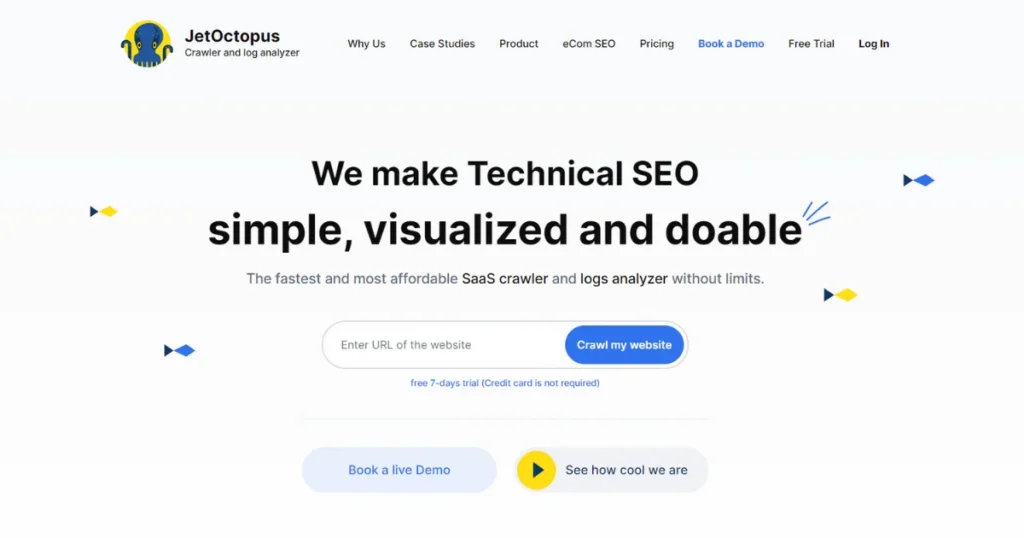
JetOctopus is a powerful tool for big businesses that want to improve their SEO. It checks how search engines like Google see your website and helps you fix issues.
Key features:
- Log Analyzer: It watches how Google and other search engines use your site.
- Google Search Console Integration: It connects to Google Search Console to show your keywords’ performance. You can see which pages get the most visitors and check your keyword rankings.
- Link Report: It tells you about the links on your site, both inside and outside.
- Compare Crawl: It looks for issues that might hurt your site’s ranking on search engines.
- Content Analysis: It shows which pages have too little content or slow down your site.
2. Botify
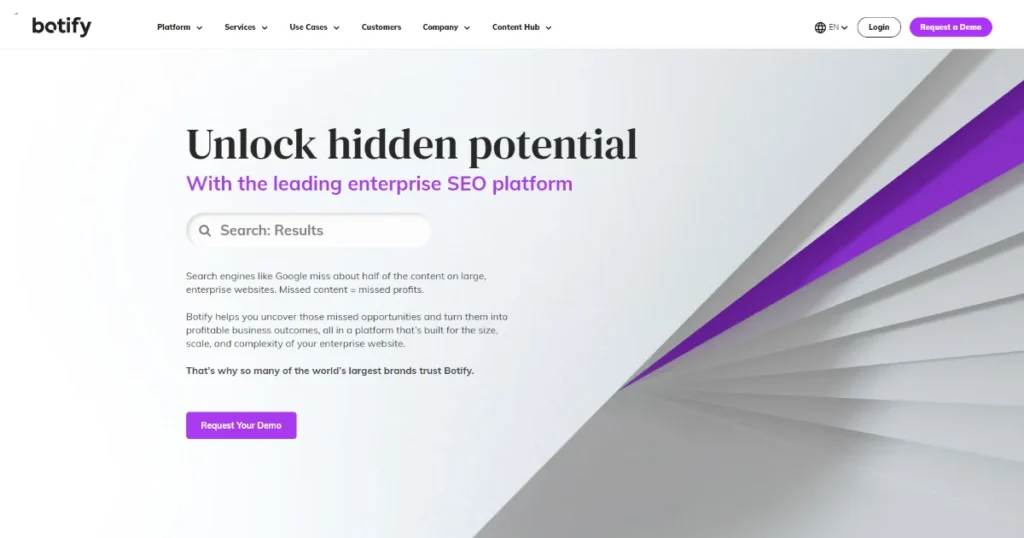
Botify is a handy tool for big businesses that want to boost their website’s search engine visibility. It has three parts:
- Botify Analytics: It helps you understand how your website is doing in search engines. You can track keywords, analyze log files, and check your site’s health.
- Botify Intelligence: This smart feature uses machine learning to find important SEO opportunities and alerts you about any urgent issues.
- Botify Activation: It makes improving your website easy without using too many resources. You can optimize quickly.
3. Conductor
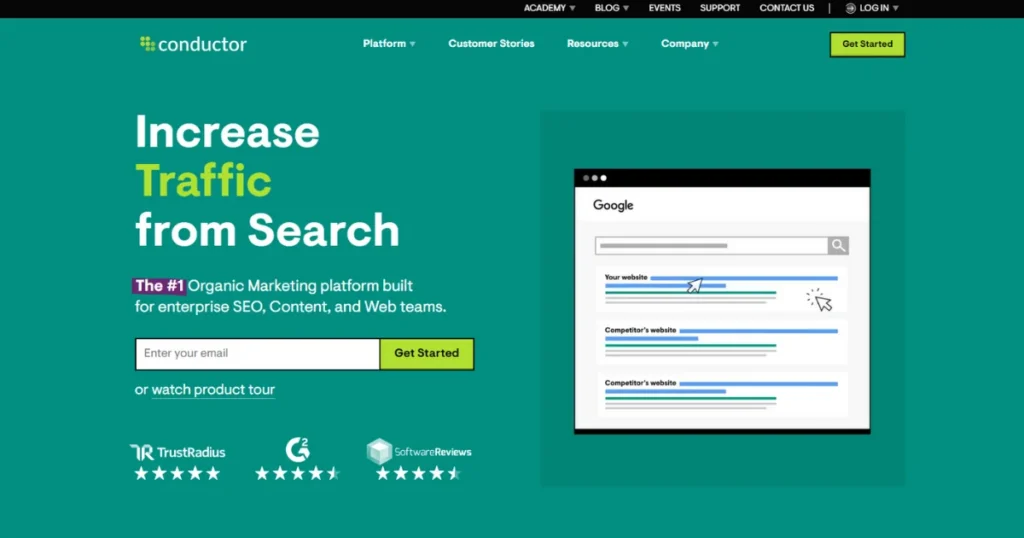
Conductor is a tool that helps big companies improve their website’s visibility and revenue. It gives you real-time insights into what your customers are searching for and suggests actions to boost your site’s performance.
One cool feature is the “Insight Stream,” which acts like a news feed. It tells you about changes in your competition, alerts you to new content opportunities, and shows traffic changes.
4. seoClarity
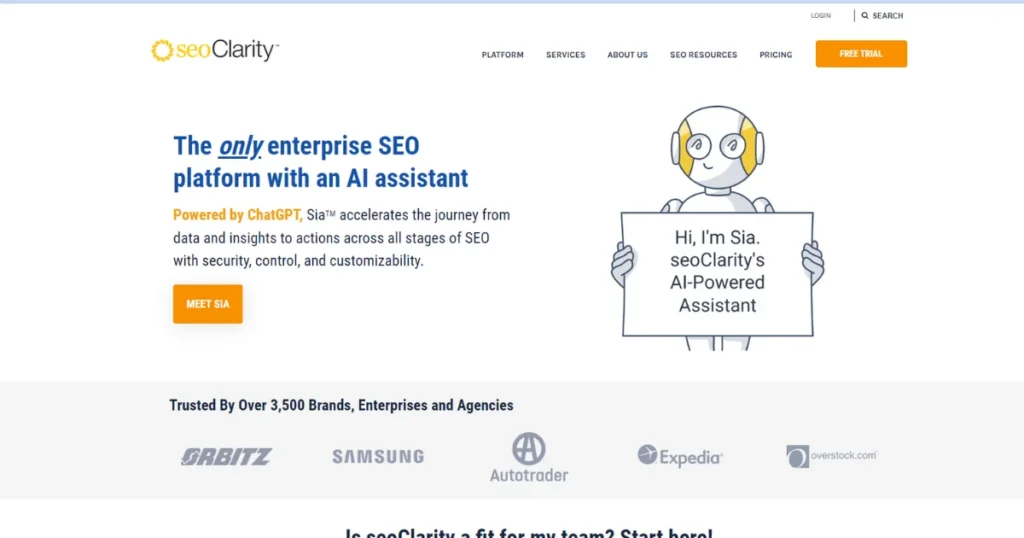
seoClarity is a powerful tool for big businesses that need SEO help. It does everything in one place, without any limits.
With seoClarity, you can check your website for technical problems and duplicate content. It’s super smart because it uses machine learning and lots of data to advise you on how your content is doing.
Simply put, it’s like a handy toolbox for fixing and improving your website’s SEO, and it has all the tools you need in one place.
5. BrightEdge
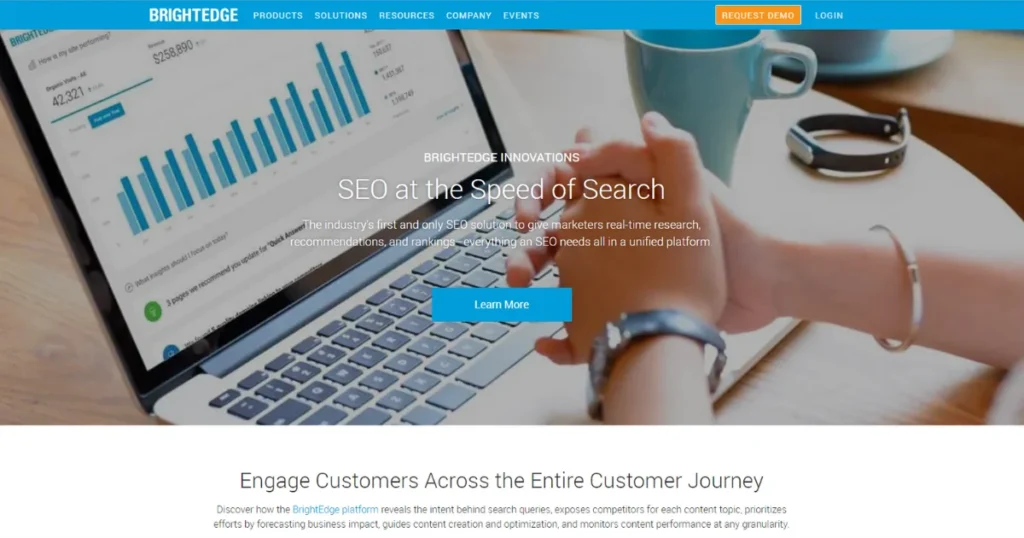
BrightEdge is a smart tool for big companies that want to improve their online presence. It uses artificial intelligence and gives you real-time insights.
Key features include:
- DataCube: It helps you research keywords and find what needs attention.
- BrightEdge Instant: You get real-time info on ranking, search volume, and more.
- BrightEdge Recommendations: It suggests ways to boost your website’s performance.
- ContentIQ: This tool checks your website for technical issues.
Successful Enterprise SaaS SEO Examples
Successful Enterprise SaaS companies have mastered the art of SEO to reach and engage their target audiences effectively. Here are a few examples:
1. HubSpot
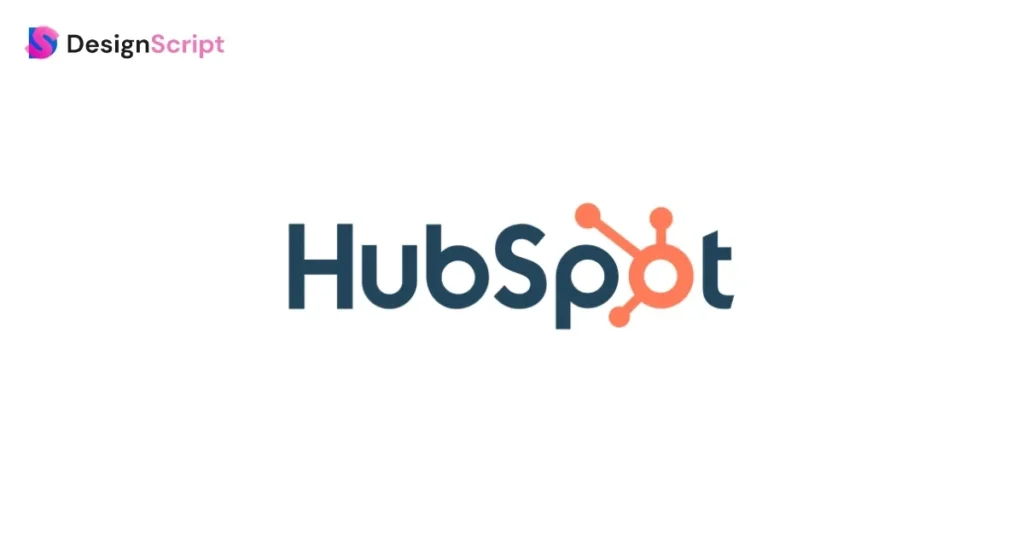
HubSpot offers a free CRM (Customer Relationship Management) tool and a wide range of marketing and sales software. Their success in SEO is evident from their page about their story and products. They provide free value through their CRM and share this story on their website, which attracts businesses looking for CRM solutions. They create content that aligns with user search intent, making it easy for potential customers to find them. Their strategy of offering free value builds trust and improves their SEO rankings.
2. Atlassian
Atlassian, known for its software products like Jira and Confluence, focuses on creating resource hubs that cater to their target audience’s needs. They become a go-to source for users seeking information about their products by offering comprehensive resources, documentation, and guides. It establishes their authority and drives organic traffic to their website. Their dedication to creating valuable content around their products shows how well they do with SEO.
3. Mailchimp
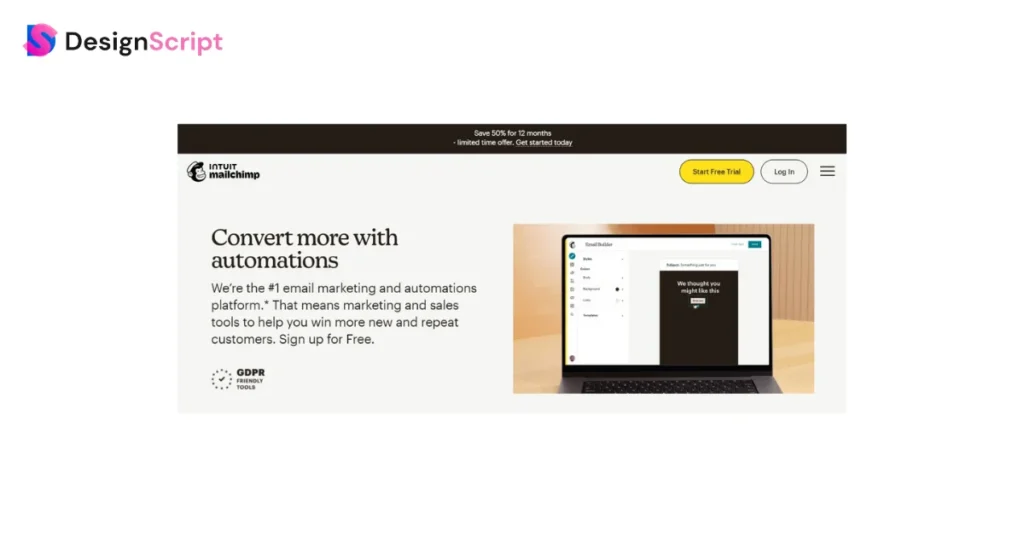
Mailchimp is a known email marketing platform. They have a glossary hub that targets high-value keywords related to email marketing. By providing a one-stop resource for email marketing terminology, they help users understand the subject better and capture organic traffic searching for email marketing information. This approach helps them dominate high-value keywords and solidify their position as an authority in the email marketing niche.
Elevate Your Enterprise SaaS SEO Today
Mastering Enterprise SaaS SEO is your key to success in the ever-evolving digital landscape. As most web journeys start with a search engine, your online visibility is non-negotiable.
You can strengthen your position in the competitive SaaS market by following the best practices, utilizing robust SEO tools, and learning from successful examples like HubSpot, Atlassian, and Mailchimp.
Always remember, SEO isn’t something you do once and forget about. It is ongoing. It requires understanding your audience, creating valuable content, optimizing your website, and staying updated with industry trends.
So, begin this journey with determination and watch your Enterprise SaaS business thrive in the digital world. The future is yours to conquer!
FAQs
Enterprise SaaS SEO targets decision-makers in large firms, focusing on software integration and corporate pain points, unlike broader traditional SEO. Additionally, its strategies are crafted to align with long sales cycles & high-value contracts.
Enterprise clients have unique search behaviors. Targeting industry-specific terms attracts high-quality leads, leading to long-term contracts. Precise keyword targeting also ensures that content resonates with the needs of enterprise decision-makers.
Content marketing, through whitepapers and case studies, positions SaaS firms as industry leaders, improving search rankings and building trust. Such tailored content also fosters engagement, establishing a deeper connection with potential enterprise clients.
Tracking key metrics provides insights into your SEO performance. Monitor organic traffic, keyword rankings, conversion rates, time on site, bounce rate, and return on investment (ROI) to assess the effectiveness of your strategy.
Technical SEO ensures your enterprise SaaS website is optimized for search engines. This includes factors like website speed, mobile-friendliness, site structure, and regular technical audits to address potential issues.

